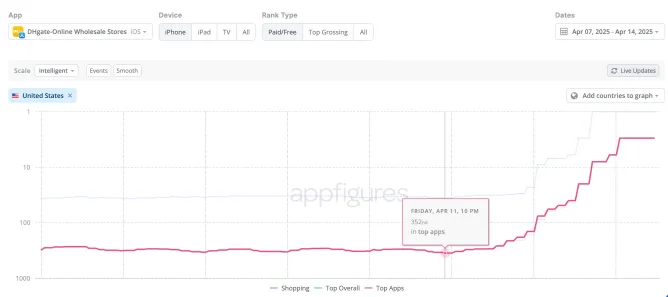In an unexpected twist to the ongoing U.S.-China trade war, a Chinese e-commerce platform has gone viral in the United States — not because of a marketing campaign, but thanks to a wave of revealing TikTok videos that have captivated American consumers. DHgate, a Chinese wholesale marketplace, has skyrocketed to the top of the U.S. App Store charts, driven by a viral social media movement that exposes the hidden truths behind the luxury fashion supply chain.
The surge began after the United States hiked tariffs on Chinese imports by a staggering 145%. In response, numerous Chinese suppliers and manufacturers turned to TikTok, creating videos that pulled back the curtain on the global luxury goods industry. These videos explained how many high-end items — including handbags, apparel, and accessories — that consumers believe are made in Europe actually originate from Chinese factories.
As these videos gained traction, so did public interest. DHgate, previously an obscure name to many U.S. consumers, leapt from a modest No. 352 spot on the App Store’s non-game charts on Friday, April 11, to No. 6 on Sunday, and by Monday morning, had secured the No. 3 spot overall among free iPhone apps. The app also hit No. 3 in the Top Overall chart, which includes both game and non-game downloads.
The viral trend clearly translated into real numbers. On Saturday, April 12, DHgate recorded 35,400 app downloads across the App Store and Google Play — a 56% increase compared to its 30-day average. Of those, 17,300 installs came from the U.S. alone, marking a 98% jump. But that was only the beginning. By Sunday, April 13, the app saw a staggering 117,500 downloads on iOS alone — a 732% spike. U.S. installs reached 65,100 — a jaw-dropping 940% increase compared to previous averages.
So what exactly is DHgate?

Founded as a cross-border e-commerce platform, DHgate connects both individual consumers and businesses to a vast network of manufacturers and suppliers in China and beyond. The platform offers more than 30 million products across categories like electronics, fashion, jewelry, toys, home goods, and health and beauty.
The sudden popularity of the app stems from a growing interest in buying directly from manufacturers, especially after TikTok creators began lifting the veil on how luxury items are produced. One widely shared video featured a Chinese factory worker explaining that many luxury handbags, including those from elite brands like Hermès, are first made in China and only later shipped to Europe where labels like “Made in Italy” or “Made in France” are added during repackaging.
Another viral creator, known online as @senbags2, broke down the cost of a $38,000 Hermès Birkin bag — revealing that it costs only around $1,400 to make. According to the video, the massive markup is due largely to the brand name and exclusive packaging. Though that TikTok account has since been removed, its content lives on through reuploads and stitched videos, further fueling the trend.
Other videos soon followed, targeting not just ultra-luxury brands like Gucci, Louis Vuitton, and Chanel, but also mid-range names such as Lululemon, Lacoste, Hugo Boss, and Tommy Hilfiger. The central message? The American consumer is more reliant on Chinese manufacturing than many realize — and that includes the products they assume are symbols of Western craftsmanship and prestige.
While this revelation is old news to those familiar with global supply chains, it was eye-opening for many TikTok viewers. The content sparked a surge of interest in bypassing traditional retail models and going straight to the source — or what appeared to be the source. That led thousands to download DHgate, eager to tap into what some believed was an opportunity to snag luxury goods at a fraction of the price.

It’s important to note, however, that not all products on DHgate are created equal. The platform is home to both original manufacturers and producers of so-called “dupes” — replicas that mimic luxury goods without the branding. For shoppers hoping to find authentic pre-branded items, the line is often blurry. Online communities like Reddit’s r/DHgate subreddit have become informal guides, helping buyers navigate the murky waters of what’s real and what’s not.
Interestingly, the app’s surge in popularity is not a viable workaround to U.S. tariffs. Any Chinese goods imported into the U.S. are still subject to those tariffs, except for a few exceptions — mostly in electronics. Still, the TikTok trend reflects a deeper frustration bubbling beneath the surface. For many Chinese suppliers, the viral videos were a form of protest, born from the frustration of increased tariffs and a desire to educate consumers on the complexities of global trade.
As one TikTok commenter wryly put it, “The U.S. claims it holds all the cards in the trade war… but China’s the one making all the cards.”
In the broader context of the U.S.-China trade conflict, the DHgate phenomenon is more than a social media fad — it’s a signal. A generation of consumers is becoming more curious, more informed, and more connected to the origins of the products they buy. And in that environment, even an obscure Chinese app can become a household name — practically overnight.










